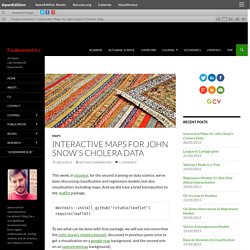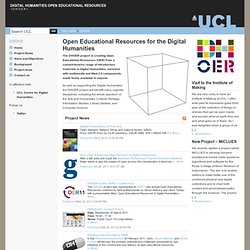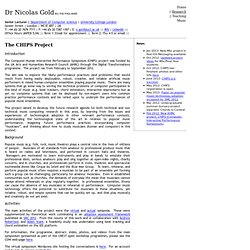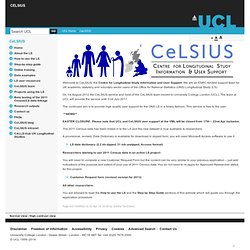

Interactive Maps for John Snow’s Cholera Data. This week, in Istanbul, for the second training on data science, we’ve been discussing classification and regression models, but also visualisation.

Including maps. And we did have a brief introduction to the leaflet package, devtools::install_github("rstudio/leaflet") require(leaflet) To see what can be done with that package, we will use one more time the John Snow’s cholera dataset, discussed in previous posts (one to get a visualisation on a google map background, and the second one on an openstreetmap background), library(sp) library(rgdal) library(maptools) setwd("/cholera/") deaths <- readShapePoints("Cholera_Deaths") df_deaths <- data.frame(deaths@coords) coordinates(df_deaths)=~coords.x1+coords.x2 proj4string(df_deaths)=CRS("+init=epsg:27700") df_deaths = spTransform(df_deaths,CRS("+proj=longlat +datum=WGS84")) df=data.frame(df_deaths@coords) lng=df$coords.x1 lat=df$coords.x2 First step.
M = leaflet()%>% addTiles() m %>% fitBounds(-.141, 51.511, -.133, 51.516) Revolutionary transitions from the eighteenth century to the present. Blog zur Praxis- und Berufsorientierung für Historikerinnen und Historiker. “Technological progress has merely provided us with more efficient means for going backwards.” ― Aldous Huxley, Ends and Means. Exploring Nightlife and Urban Transformation in Contemporary Lisbon. Www.CVCE.eu Building the research infrastructure for European Integration Studies. The Dutch Cemetery in Chinsurah. Dm2e. DHOER. The DHOER project is creating Open Educational Resources (OER) from a comprehensive range of introductory materials in Digital Humanities, enriched with multimedia and Web 2.0 components, made freely available to anyone.

As well as supporting the Digital Humanities, the DHOER project will benefit many cognate disciplines, including the whole spectrum of the Arts and Humanities, Cultural Heritage, Information Studies, Library Studies, and Computer Science. Digital Humanities in Practice Claire Warwick, Melissa Terras and Julianne Nyhan, editors Price: £49.95 Price (to CILIP members): £39.96 ISBN: 978-1-85604-766-1 More... Published: Oct 2, 2012 12:54:36 PM Live chat: Exploring Open Access in Higher Education After a talk point and a poll, the Guardian Professional Higher Education Network finally wants to give the subject of open access the consideration it deserves. Published: Oct 28, 2011 10:01:07 AM DHOER at the OER11 conference. UCLDHOER (UCLDHOER) sur Twitter. CIDER: Centre for Interaction Data Estimation and Research. Dr Nicolas Gold BSc PhD FHEA MIEEE. Introduction The Computer-Human Interactive Performance Symposium (CHIPS) project was funded by the UK Arts and Humanities Research Council (AHRC) through the Digital Transformations programme.

The project ran from February to September 2012. The aim was to explore the likely performance practices (and problems) that would result from having easily deployable, robust, creative, and reliable artificial music performers in mixed human-computer ensembles playing popular music. There are many systems that go some way to solving the technical problems of computer participation in this kind of music (e.g. beat trackers, chord estimators, interactive improvisers) but as yet no complete systems that can be deployed by non-expert users into common practice performance contexts and be relied upon to underpin the performances of popular music ensembles. Background Popular music (e.g. folk, rock, music theatre) plays a central role in the lives of millions of people. Activities Outcomes. CeLSIUS. Welcome to CeLSIUS, the Centre for Longitudinal Study Information and User Support.

We are an ESRC-funded support team for UK academic, statutory and voluntary sector users of the Office for National Statistics (ONS) Longitudinal Study (LS). On 1st August 2012 the CeLSIUS service and most of the CeLSIUS team moved to University College London (UCL). The team at UCL will provide the service until 31st July 2017. The continued aim is to provide high quality user support for the ONS LS in a timely fashion. This service is free to the user. EASTER CLOSURE: Please note that UCL and CeLSIUS user support at the VML will be closed from 17th – 22nd Apr inclusive. The 2011 Census data has been linked in to the LS and the new dataset is now available to researchers. A provisional, revised, Data Dictionary is available for download in zipped form; you will need Microsoft Access software to use it.
4humanities.